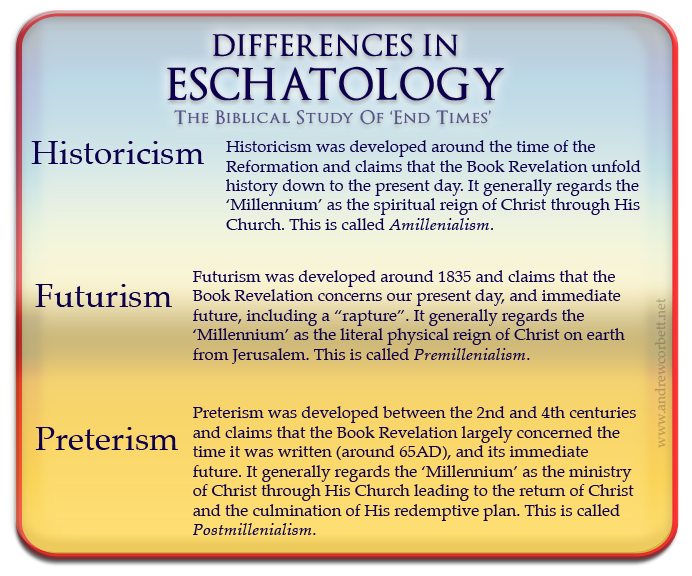About the two beasts:
Were the horsemen of Chapter 9 a component of one of the beasts of Revelation 13? That chapter begins thus:
And I saw a beast rising out of the sea, with ten horns and seven heads, with ten diadems on its horns and blasphemous names on its heads. (Rv 13:1)
This beast comes from the sea. A common assumption is that this is a sea monster (the only assumption possible from a literal perspective), but what is the sea? Is it water or is it something else? Like other nations, perhaps?
The sea, generically, refers to the Mediterranean Sea or Red Sea or generally any sea in the Middle East. In Isaiah 11:11, we read that a handful of Jews will reclaim their land from all their maritime oppressors. “In that day the Lord will extend his hand yet a second time to recover the remnant that remains of his people from Assyria, from Egypt, from Pathros, from Cush, from Elam, from Shinar, from Hamath, and from the coastlands of the sea.” Also consider Isaiah 60:5 and note that wealth comes from the sea—not from fishing but from nations around the sea:
Then you shall see and be radiant;
your heart shall thrill and exult,
because the abundance of the sea shall be turned to you,
the wealth of the nations shall come to you.
Ellicott’s Commentary for English Readers says that the abundance of the sea is the riches of the Western isles. Other commentaries call this seaborne wealth a wealth of maritime nations. Earlier in Isaiah, these foreign nations are referred to as the wilderness of the sea (21:1), or specifically in this case, according to Ellicott, as the nations of Elam and Media. Certainly wealth literally could be derived from any body of water; even in Israel, lakes and streams could be fished. When a beast comes from the sea, however, it is a foreign aggressor.
The first beast, then, the beast rising out of the sea, is a foreign aggressor, and the foreign aggressor in John’s lifetime is Rome, specifically the Tenth Legion in Jerusalem. While the Jews are held captive in Jerusalem and stricken with scarcity and starvation, the Romans are free to engage in commerce. In the city, kings, merchants, and shippers mourn, since they can no longer luxuriate in the formerly wealthy capital and since no one buys their cargo anymore (
Rv 18:9-19). Outside the city, Romans continue to supply their troops.
Some have ascribed the number of this beast to Nero, Rome’s mouthpiece (13:5) who was still emperor when the war started. Contemporary scholarship refutes this because the number of the beast is actually 616. Whatever the specifics, the ability to buy and sell remained the province and privilege of the Romans and to Jews who managed to escape their captors and find refuge with the other side. Allegiance to Rome was the hope of eating and surviving.
Israel, to the Israelites, of course, is their land, often referred to as the earth, remember. The second beast, then, the beast rising out of the land, is Israel. This two-horned beast (13:11), history informs us, is comprised of two factions: that enraged and impulsive lot among the Israelites, the Zealots, and their similarly dispositioned allies the Idumeans.
Rome exercised authority over Judea (13:7), whose inhabitants were made to obey, or “worship,” Rome (13:12). The fury of the Zealots must have been palatable.
Around the turn of the millennium, Judaism was divided into four major sects under the Great Sanhedrin: the Sadducees, the higher priesthood and nobility who centered their authority on the temple; the Pharisees, who derived their authority from the Torah and Mosaic Law; and the Essenes, a peaceful group of ascetics. The fourth sect formed much more recently and diverged sharply from the other three. This sect of Zealots was a militant, anti-Roman splinter group on a quest to expel and kill Romans,
[ii] and also Christians and moderate Jews and anyone else who ventured into Jerusalem and sympathized with Rome.
The Apostle Paul encounters some of these Zealots in Ephesus when they chase him out of a synagogue, leaving him to preach in a schoolhouse (
Acts 19:9-11). A former Pharisee and not afraid to speak his mind, Paul was not loathe to refer to them as beasts (
1 Cor 15:32). For indeed these people were so driven by madness that they would have done anything to torment and expel the Romans, even if it meant persecuting their own people and allowing their own temple to burn down.
Rome, seeking order in its domain (to maintain the
Pax Romana of the era), and Israel, motivated largely by Zealot hatred of Rome, are the two principal players in the Jewish-Roman Wars. The beast from the sea and the beast from the land would engage each other in three major struggles that would last well into the second century. The first of the three major confrontations lasted from AD 67 to AD 70. For these three and a half years, Christians fled while Zealots slaughtered moderate Jews and Roman soldiers.
Charles John Ellicott, ed., Ellicott’s Bible Commentary for English Readers, Vol. 2 (Delmarva Publications, Inc., 2015), Kindle eBook.
[ii] The Editors at Charles River Editors, The Ancient Roman Sieges of Jerusalem and Masada: The History of the first Jewish-Roman War’s Most Famous Battles (Charles River Editors Publishing Company) Kindle eBook.
